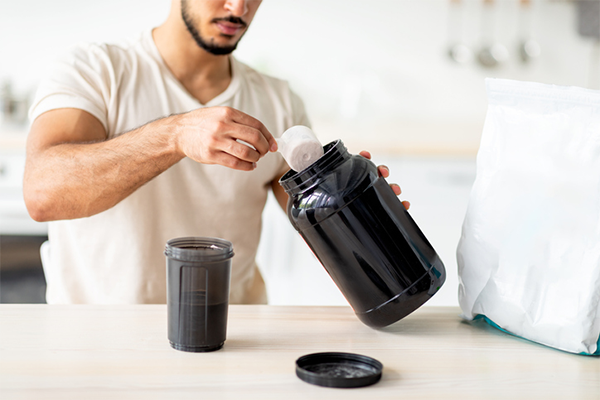When it comes to supplementing with protein, there's a not-so-pleasant reality: it can lead to feeling bloated and gassy, making you quite conspicuous. Yes, even celebrities like James McAvoy have experienced the dreaded protein farts. But fear not, we're here to tackle this issue together. Let's explore why protein can cause gas and flatulence in some individuals and what can be done to prevent it.
Understanding the Causes of Protein Farts
Protein farts are often linked to two common ingredients found in protein powder supplements.
1. Sweeteners
According to Allison Sizemore, a certified sports nutritionist, certain protein supplements can lead to gas and bloating due to sugar substitutes and sugar alcohols they contain. These additives like xylitol, mannitol, and sorbitol are known to cause gas.
2. Lactose
Steve Theunissen, a registered dietitian nutritionist, explains that whey protein powder, a popular choice, can cause bloating because of its lactose content. If you're sensitive to dairy products and experience bloating or gas after consuming milk, you might have a similar reaction to some protein supplements.
Tips to Combat Protein Farts

Here are some effective strategies to prevent unwanted flatulence caused by protein intake.
1. Opt for unsweetened protein powder
Start by choosing a protein powder without specific sweeteners like xylitol or mannitol to avoid digestive issues.
Consider trying Beachbody Performance Recover, a high-quality protein powder free from artificial sweeteners and colors. It contains 20 grams of protein per scoop and includes pomegranate extract to help reduce post-workout muscle soreness.
2. Give whey isolate a shot
Whey protein isolate, with higher protein content and less lactose, could be a better option for those looking to minimize digestive discomfort.
Certified personal trainer Joe Johnson recommends whey isolate for easier digestion, especially for individuals with lactose intolerance.
3. Experiment with plant-based protein powder
If dairy or whey protein isn't your friend, consider switching to plant-based options like pea protein powder, which offers all essential amino acids with minimal carbs.
However, plant-based powders may not be suitable for everyone, as they can also cause gas and bloating in some individuals.
4. Stick to whole-food protein sources
If protein supplements continue to cause discomfort, opt for whole-food protein sources like animal proteins to avoid gas and bloating.
Understanding the Risks of Excessive Protein Consumption

While consuming too much protein can have potential health risks, it's unlikely to have a negative impact unless you're exceeding your body's capacity to process it. Excess protein calories may be converted into fat, rather than muscle-building benefits.
Here are some key protein guidelines to keep in mind:
- For weight management and muscle growth, aim for a macronutrient ratio of around 40% carbs, 30% protein, and 30% fat.
- The recommended daily protein intake is 0.8 grams per kilogram of body weight for the average person. Active individuals or older adults may require 1.2 to 1.6 grams per kilogram daily.
- Athletes or regular exercisers should aim for 1.2 to 2.0 grams of protein per kilogram of body weight per day, based on their training intensity.
